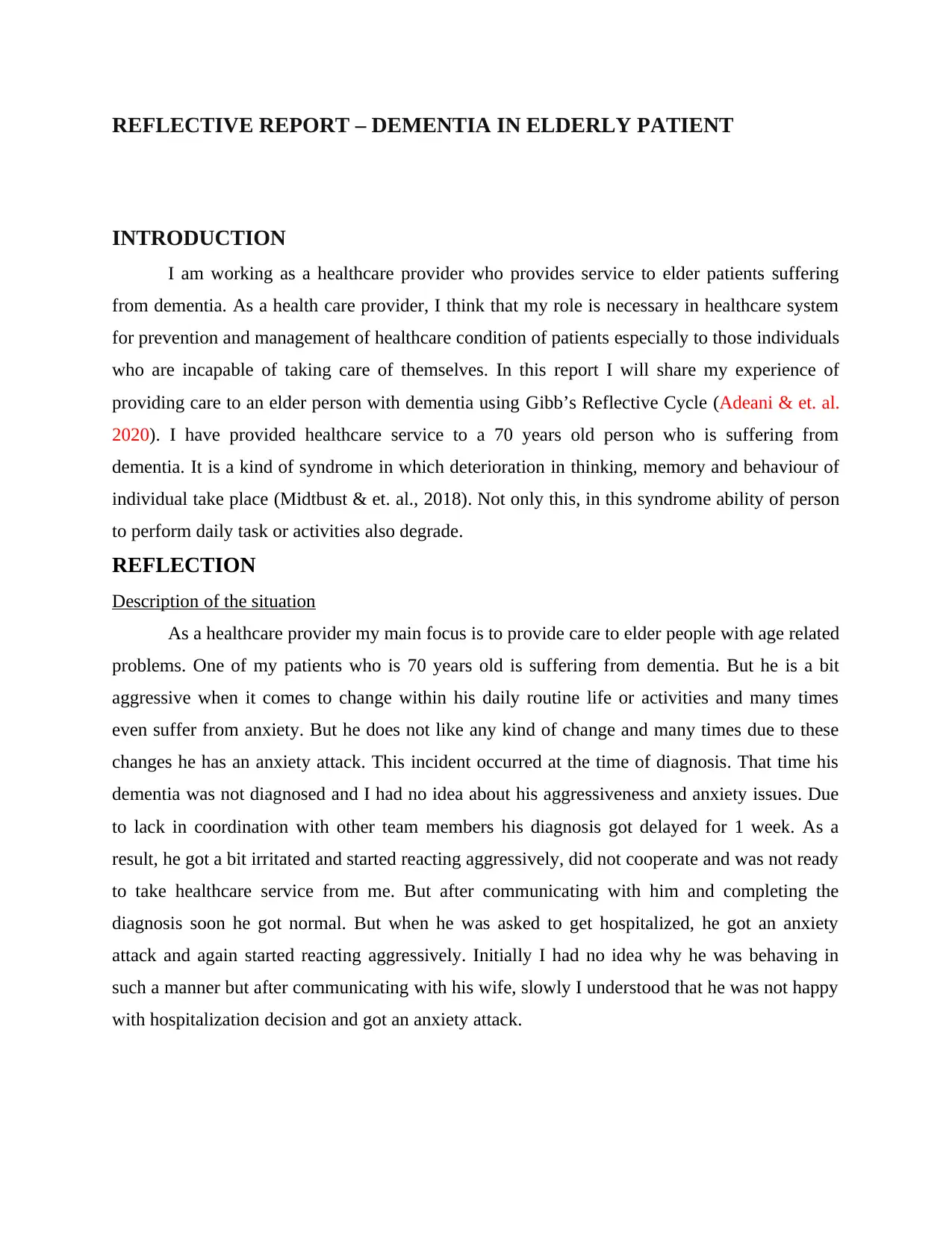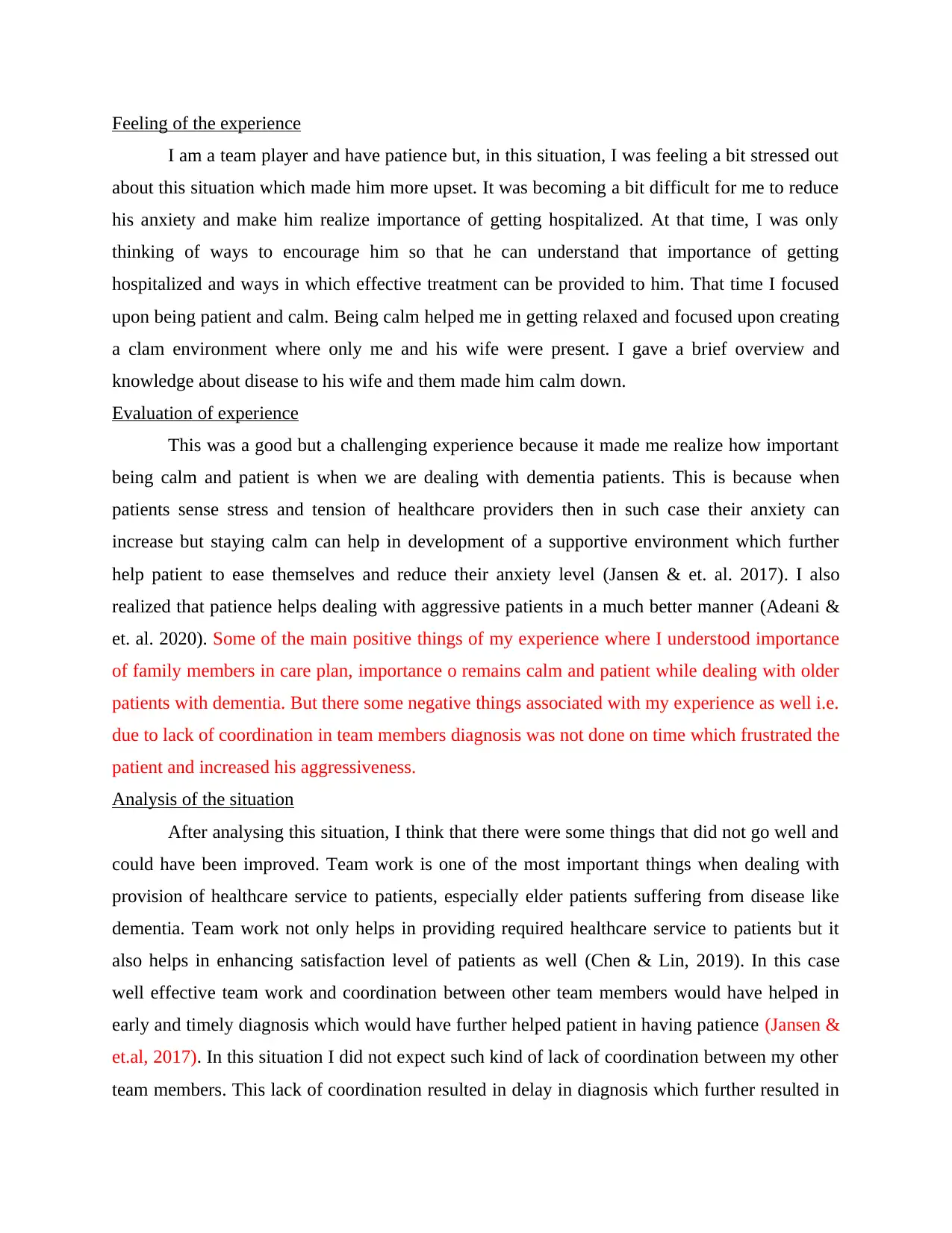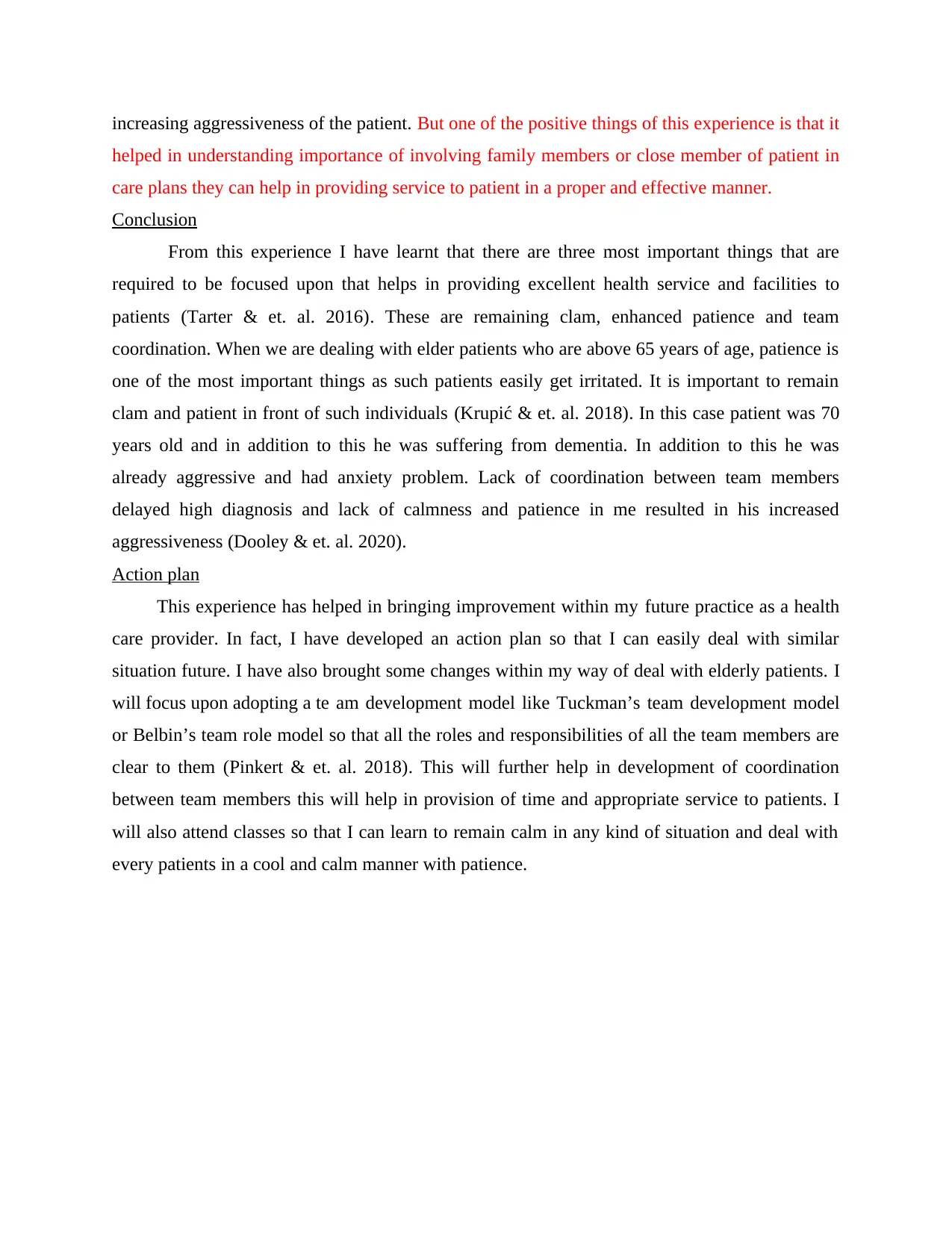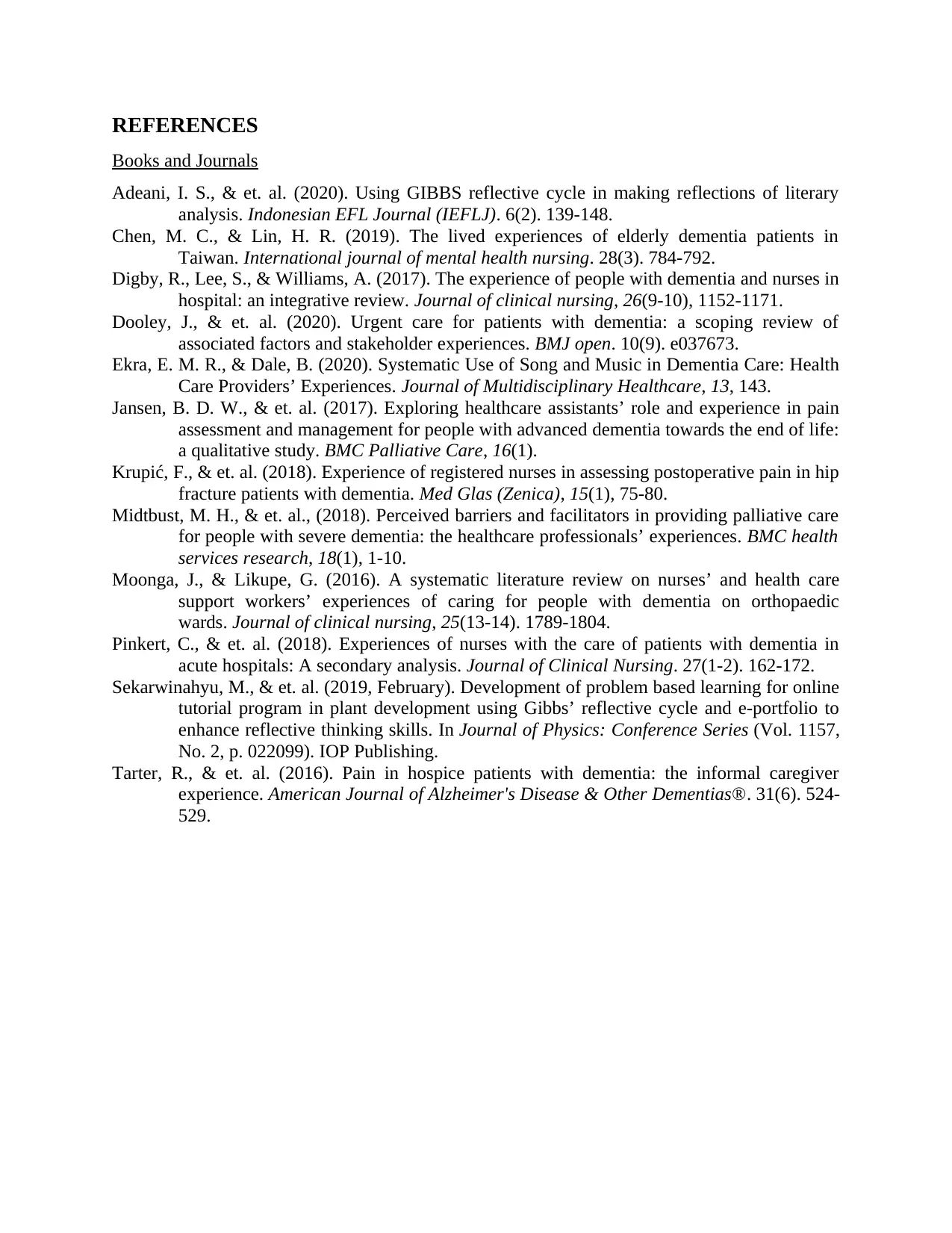Reflective Report: Dementia Care for Elderly Patients in Healthcare
VerifiedAdded on 2023/01/06
|5
|1788
|44
Report
AI Summary
This reflective report details a healthcare provider's experience in caring for a 70-year-old patient with dementia, focusing on the challenges of managing the patient's anxiety and aggressive behavior, particularly during diagnosis and hospitalization decisions. The report utilizes Gibbs' Reflective Cycle to describe the situation, the healthcare provider's feelings, evaluation of the experience, and analysis of the situation. The provider reflects on the importance of patience, teamwork, and family involvement in dementia care. The analysis highlights the impact of delayed diagnosis due to poor team coordination. The report concludes with an action plan to improve future practice by focusing on team development, enhanced communication, and strategies to remain calm and patient when dealing with elderly patients. References to relevant literature are also included.

REFLECTIVE REPORT – DEMENTIA IN ELDERLY PATIENT
INTRODUCTION
I am working as a healthcare provider who provides service to elder patients suffering
from dementia. As a health care provider, I think that my role is necessary in healthcare system
for prevention and management of healthcare condition of patients especially to those individuals
who are incapable of taking care of themselves. In this report I will share my experience of
providing care to an elder person with dementia using Gibb’s Reflective Cycle (Adeani & et. al.
2020). I have provided healthcare service to a 70 years old person who is suffering from
dementia. It is a kind of syndrome in which deterioration in thinking, memory and behaviour of
individual take place (Midtbust & et. al., 2018). Not only this, in this syndrome ability of person
to perform daily task or activities also degrade.
REFLECTION
Description of the situation
As a healthcare provider my main focus is to provide care to elder people with age related
problems. One of my patients who is 70 years old is suffering from dementia. But he is a bit
aggressive when it comes to change within his daily routine life or activities and many times
even suffer from anxiety. But he does not like any kind of change and many times due to these
changes he has an anxiety attack. This incident occurred at the time of diagnosis. That time his
dementia was not diagnosed and I had no idea about his aggressiveness and anxiety issues. Due
to lack in coordination with other team members his diagnosis got delayed for 1 week. As a
result, he got a bit irritated and started reacting aggressively, did not cooperate and was not ready
to take healthcare service from me. But after communicating with him and completing the
diagnosis soon he got normal. But when he was asked to get hospitalized, he got an anxiety
attack and again started reacting aggressively. Initially I had no idea why he was behaving in
such a manner but after communicating with his wife, slowly I understood that he was not happy
with hospitalization decision and got an anxiety attack.
INTRODUCTION
I am working as a healthcare provider who provides service to elder patients suffering
from dementia. As a health care provider, I think that my role is necessary in healthcare system
for prevention and management of healthcare condition of patients especially to those individuals
who are incapable of taking care of themselves. In this report I will share my experience of
providing care to an elder person with dementia using Gibb’s Reflective Cycle (Adeani & et. al.
2020). I have provided healthcare service to a 70 years old person who is suffering from
dementia. It is a kind of syndrome in which deterioration in thinking, memory and behaviour of
individual take place (Midtbust & et. al., 2018). Not only this, in this syndrome ability of person
to perform daily task or activities also degrade.
REFLECTION
Description of the situation
As a healthcare provider my main focus is to provide care to elder people with age related
problems. One of my patients who is 70 years old is suffering from dementia. But he is a bit
aggressive when it comes to change within his daily routine life or activities and many times
even suffer from anxiety. But he does not like any kind of change and many times due to these
changes he has an anxiety attack. This incident occurred at the time of diagnosis. That time his
dementia was not diagnosed and I had no idea about his aggressiveness and anxiety issues. Due
to lack in coordination with other team members his diagnosis got delayed for 1 week. As a
result, he got a bit irritated and started reacting aggressively, did not cooperate and was not ready
to take healthcare service from me. But after communicating with him and completing the
diagnosis soon he got normal. But when he was asked to get hospitalized, he got an anxiety
attack and again started reacting aggressively. Initially I had no idea why he was behaving in
such a manner but after communicating with his wife, slowly I understood that he was not happy
with hospitalization decision and got an anxiety attack.
Paraphrase This Document
Need a fresh take? Get an instant paraphrase of this document with our AI Paraphraser

Feeling of the experience
I am a team player and have patience but, in this situation, I was feeling a bit stressed out
about this situation which made him more upset. It was becoming a bit difficult for me to reduce
his anxiety and make him realize importance of getting hospitalized. At that time, I was only
thinking of ways to encourage him so that he can understand that importance of getting
hospitalized and ways in which effective treatment can be provided to him. That time I focused
upon being patient and calm. Being calm helped me in getting relaxed and focused upon creating
a clam environment where only me and his wife were present. I gave a brief overview and
knowledge about disease to his wife and them made him calm down.
Evaluation of experience
This was a good but a challenging experience because it made me realize how important
being calm and patient is when we are dealing with dementia patients. This is because when
patients sense stress and tension of healthcare providers then in such case their anxiety can
increase but staying calm can help in development of a supportive environment which further
help patient to ease themselves and reduce their anxiety level (Jansen & et. al. 2017). I also
realized that patience helps dealing with aggressive patients in a much better manner (Adeani &
et. al. 2020). Some of the main positive things of my experience where I understood importance
of family members in care plan, importance o remains calm and patient while dealing with older
patients with dementia. But there some negative things associated with my experience as well i.e.
due to lack of coordination in team members diagnosis was not done on time which frustrated the
patient and increased his aggressiveness.
Analysis of the situation
After analysing this situation, I think that there were some things that did not go well and
could have been improved. Team work is one of the most important things when dealing with
provision of healthcare service to patients, especially elder patients suffering from disease like
dementia. Team work not only helps in providing required healthcare service to patients but it
also helps in enhancing satisfaction level of patients as well (Chen & Lin, 2019). In this case
well effective team work and coordination between other team members would have helped in
early and timely diagnosis which would have further helped patient in having patience (Jansen &
et.al, 2017). In this situation I did not expect such kind of lack of coordination between my other
team members. This lack of coordination resulted in delay in diagnosis which further resulted in
I am a team player and have patience but, in this situation, I was feeling a bit stressed out
about this situation which made him more upset. It was becoming a bit difficult for me to reduce
his anxiety and make him realize importance of getting hospitalized. At that time, I was only
thinking of ways to encourage him so that he can understand that importance of getting
hospitalized and ways in which effective treatment can be provided to him. That time I focused
upon being patient and calm. Being calm helped me in getting relaxed and focused upon creating
a clam environment where only me and his wife were present. I gave a brief overview and
knowledge about disease to his wife and them made him calm down.
Evaluation of experience
This was a good but a challenging experience because it made me realize how important
being calm and patient is when we are dealing with dementia patients. This is because when
patients sense stress and tension of healthcare providers then in such case their anxiety can
increase but staying calm can help in development of a supportive environment which further
help patient to ease themselves and reduce their anxiety level (Jansen & et. al. 2017). I also
realized that patience helps dealing with aggressive patients in a much better manner (Adeani &
et. al. 2020). Some of the main positive things of my experience where I understood importance
of family members in care plan, importance o remains calm and patient while dealing with older
patients with dementia. But there some negative things associated with my experience as well i.e.
due to lack of coordination in team members diagnosis was not done on time which frustrated the
patient and increased his aggressiveness.
Analysis of the situation
After analysing this situation, I think that there were some things that did not go well and
could have been improved. Team work is one of the most important things when dealing with
provision of healthcare service to patients, especially elder patients suffering from disease like
dementia. Team work not only helps in providing required healthcare service to patients but it
also helps in enhancing satisfaction level of patients as well (Chen & Lin, 2019). In this case
well effective team work and coordination between other team members would have helped in
early and timely diagnosis which would have further helped patient in having patience (Jansen &
et.al, 2017). In this situation I did not expect such kind of lack of coordination between my other
team members. This lack of coordination resulted in delay in diagnosis which further resulted in

increasing aggressiveness of the patient. But one of the positive things of this experience is that it
helped in understanding importance of involving family members or close member of patient in
care plans they can help in providing service to patient in a proper and effective manner.
Conclusion
From this experience I have learnt that there are three most important things that are
required to be focused upon that helps in providing excellent health service and facilities to
patients (Tarter & et. al. 2016). These are remaining clam, enhanced patience and team
coordination. When we are dealing with elder patients who are above 65 years of age, patience is
one of the most important things as such patients easily get irritated. It is important to remain
clam and patient in front of such individuals (Krupić & et. al. 2018). In this case patient was 70
years old and in addition to this he was suffering from dementia. In addition to this he was
already aggressive and had anxiety problem. Lack of coordination between team members
delayed high diagnosis and lack of calmness and patience in me resulted in his increased
aggressiveness (Dooley & et. al. 2020).
Action plan
This experience has helped in bringing improvement within my future practice as a health
care provider. In fact, I have developed an action plan so that I can easily deal with similar
situation future. I have also brought some changes within my way of deal with elderly patients. I
will focus upon adopting a te am development model like Tuckman’s team development model
or Belbin’s team role model so that all the roles and responsibilities of all the team members are
clear to them (Pinkert & et. al. 2018). This will further help in development of coordination
between team members this will help in provision of time and appropriate service to patients. I
will also attend classes so that I can learn to remain calm in any kind of situation and deal with
every patients in a cool and calm manner with patience.
helped in understanding importance of involving family members or close member of patient in
care plans they can help in providing service to patient in a proper and effective manner.
Conclusion
From this experience I have learnt that there are three most important things that are
required to be focused upon that helps in providing excellent health service and facilities to
patients (Tarter & et. al. 2016). These are remaining clam, enhanced patience and team
coordination. When we are dealing with elder patients who are above 65 years of age, patience is
one of the most important things as such patients easily get irritated. It is important to remain
clam and patient in front of such individuals (Krupić & et. al. 2018). In this case patient was 70
years old and in addition to this he was suffering from dementia. In addition to this he was
already aggressive and had anxiety problem. Lack of coordination between team members
delayed high diagnosis and lack of calmness and patience in me resulted in his increased
aggressiveness (Dooley & et. al. 2020).
Action plan
This experience has helped in bringing improvement within my future practice as a health
care provider. In fact, I have developed an action plan so that I can easily deal with similar
situation future. I have also brought some changes within my way of deal with elderly patients. I
will focus upon adopting a te am development model like Tuckman’s team development model
or Belbin’s team role model so that all the roles and responsibilities of all the team members are
clear to them (Pinkert & et. al. 2018). This will further help in development of coordination
between team members this will help in provision of time and appropriate service to patients. I
will also attend classes so that I can learn to remain calm in any kind of situation and deal with
every patients in a cool and calm manner with patience.
⊘ This is a preview!⊘
Do you want full access?
Subscribe today to unlock all pages.

Trusted by 1+ million students worldwide

REFERENCES
Books and Journals
Adeani, I. S., & et. al. (2020). Using GIBBS reflective cycle in making reflections of literary
analysis. Indonesian EFL Journal (IEFLJ). 6(2). 139-148.
Chen, M. C., & Lin, H. R. (2019). The lived experiences of elderly dementia patients in
Taiwan. International journal of mental health nursing. 28(3). 784-792.
Digby, R., Lee, S., & Williams, A. (2017). The experience of people with dementia and nurses in
hospital: an integrative review. Journal of clinical nursing, 26(9-10), 1152-1171.
Dooley, J., & et. al. (2020). Urgent care for patients with dementia: a scoping review of
associated factors and stakeholder experiences. BMJ open. 10(9). e037673.
Ekra, E. M. R., & Dale, B. (2020). Systematic Use of Song and Music in Dementia Care: Health
Care Providers’ Experiences. Journal of Multidisciplinary Healthcare, 13, 143.
Jansen, B. D. W., & et. al. (2017). Exploring healthcare assistants’ role and experience in pain
assessment and management for people with advanced dementia towards the end of life:
a qualitative study. BMC Palliative Care, 16(1).
Krupić, F., & et. al. (2018). Experience of registered nurses in assessing postoperative pain in hip
fracture patients with dementia. Med Glas (Zenica), 15(1), 75-80.
Midtbust, M. H., & et. al., (2018). Perceived barriers and facilitators in providing palliative care
for people with severe dementia: the healthcare professionals’ experiences. BMC health
services research, 18(1), 1-10.
Moonga, J., & Likupe, G. (2016). A systematic literature review on nurses’ and health care
support workers’ experiences of caring for people with dementia on orthopaedic
wards. Journal of clinical nursing, 25(13-14). 1789-1804.
Pinkert, C., & et. al. (2018). Experiences of nurses with the care of patients with dementia in
acute hospitals: A secondary analysis. Journal of Clinical Nursing. 27(1-2). 162-172.
Sekarwinahyu, M., & et. al. (2019, February). Development of problem based learning for online
tutorial program in plant development using Gibbs’ reflective cycle and e-portfolio to
enhance reflective thinking skills. In Journal of Physics: Conference Series (Vol. 1157,
No. 2, p. 022099). IOP Publishing.
Tarter, R., & et. al. (2016). Pain in hospice patients with dementia: the informal caregiver
experience. American Journal of Alzheimer's Disease & Other Dementias®. 31(6). 524-
529.
Books and Journals
Adeani, I. S., & et. al. (2020). Using GIBBS reflective cycle in making reflections of literary
analysis. Indonesian EFL Journal (IEFLJ). 6(2). 139-148.
Chen, M. C., & Lin, H. R. (2019). The lived experiences of elderly dementia patients in
Taiwan. International journal of mental health nursing. 28(3). 784-792.
Digby, R., Lee, S., & Williams, A. (2017). The experience of people with dementia and nurses in
hospital: an integrative review. Journal of clinical nursing, 26(9-10), 1152-1171.
Dooley, J., & et. al. (2020). Urgent care for patients with dementia: a scoping review of
associated factors and stakeholder experiences. BMJ open. 10(9). e037673.
Ekra, E. M. R., & Dale, B. (2020). Systematic Use of Song and Music in Dementia Care: Health
Care Providers’ Experiences. Journal of Multidisciplinary Healthcare, 13, 143.
Jansen, B. D. W., & et. al. (2017). Exploring healthcare assistants’ role and experience in pain
assessment and management for people with advanced dementia towards the end of life:
a qualitative study. BMC Palliative Care, 16(1).
Krupić, F., & et. al. (2018). Experience of registered nurses in assessing postoperative pain in hip
fracture patients with dementia. Med Glas (Zenica), 15(1), 75-80.
Midtbust, M. H., & et. al., (2018). Perceived barriers and facilitators in providing palliative care
for people with severe dementia: the healthcare professionals’ experiences. BMC health
services research, 18(1), 1-10.
Moonga, J., & Likupe, G. (2016). A systematic literature review on nurses’ and health care
support workers’ experiences of caring for people with dementia on orthopaedic
wards. Journal of clinical nursing, 25(13-14). 1789-1804.
Pinkert, C., & et. al. (2018). Experiences of nurses with the care of patients with dementia in
acute hospitals: A secondary analysis. Journal of Clinical Nursing. 27(1-2). 162-172.
Sekarwinahyu, M., & et. al. (2019, February). Development of problem based learning for online
tutorial program in plant development using Gibbs’ reflective cycle and e-portfolio to
enhance reflective thinking skills. In Journal of Physics: Conference Series (Vol. 1157,
No. 2, p. 022099). IOP Publishing.
Tarter, R., & et. al. (2016). Pain in hospice patients with dementia: the informal caregiver
experience. American Journal of Alzheimer's Disease & Other Dementias®. 31(6). 524-
529.
Paraphrase This Document
Need a fresh take? Get an instant paraphrase of this document with our AI Paraphraser

1
1 out of 5
Related Documents
Your All-in-One AI-Powered Toolkit for Academic Success.
+13062052269
info@desklib.com
Available 24*7 on WhatsApp / Email
![[object Object]](/_next/static/media/star-bottom.7253800d.svg)
Unlock your academic potential
Copyright © 2020–2026 A2Z Services. All Rights Reserved. Developed and managed by ZUCOL.





